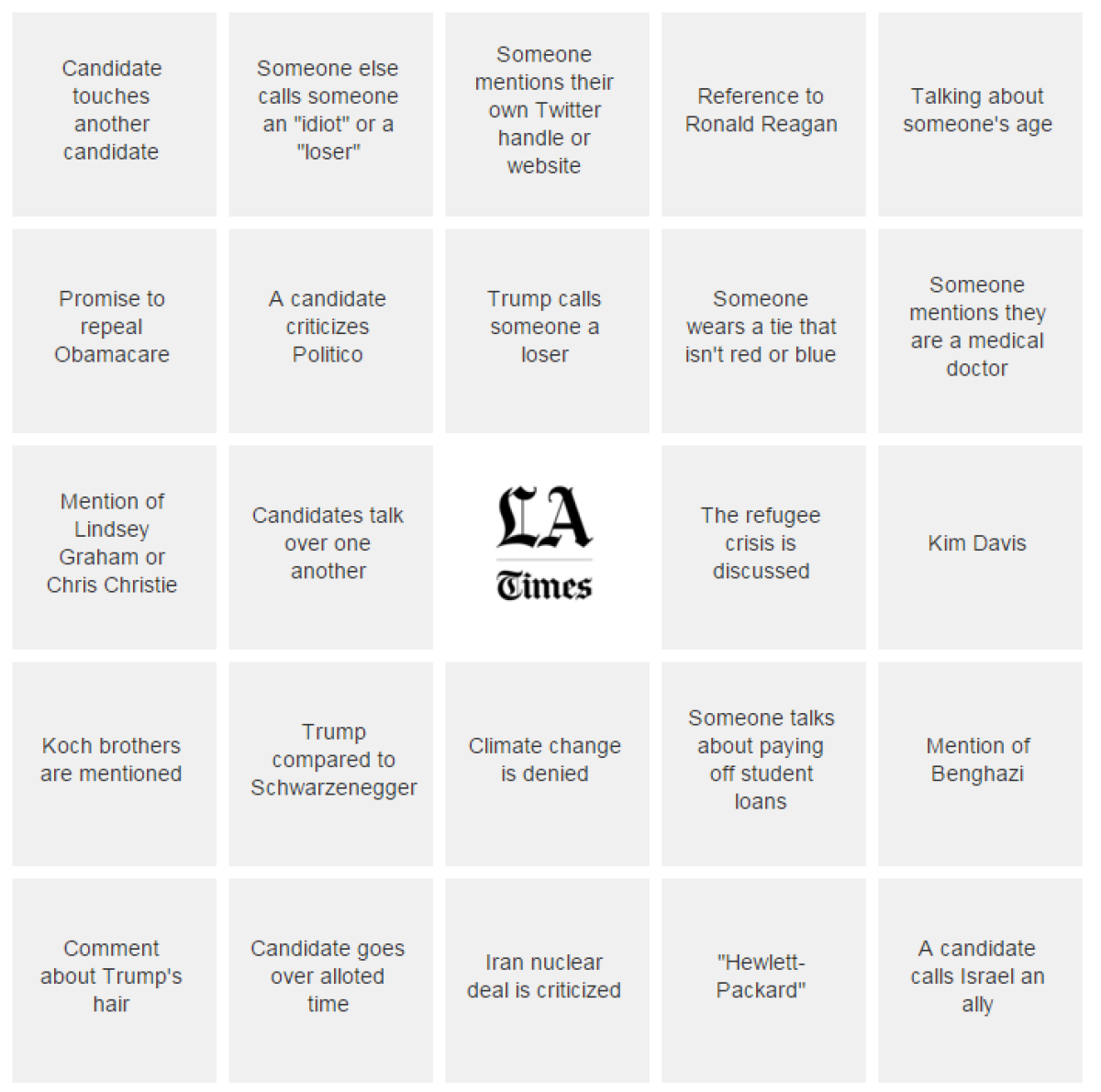Fourth GOP debate aftermath: The field seems to have figured out how to fight Donald Trump
By the numbers
The fourth Republican debate of the season, which was hosted in Milwaukee, is over. The next presidential debate is on the Democratic side, and will be held on Saturday night in Iowa.
- Gov. Bobby Jindal attacked, Gov. Chris Christie wouldn't be baited, and other takeaways from the early undercard debate.
- Compare the GOP candidates
The secret to deflating Trump and other takeaways from tonight's debate
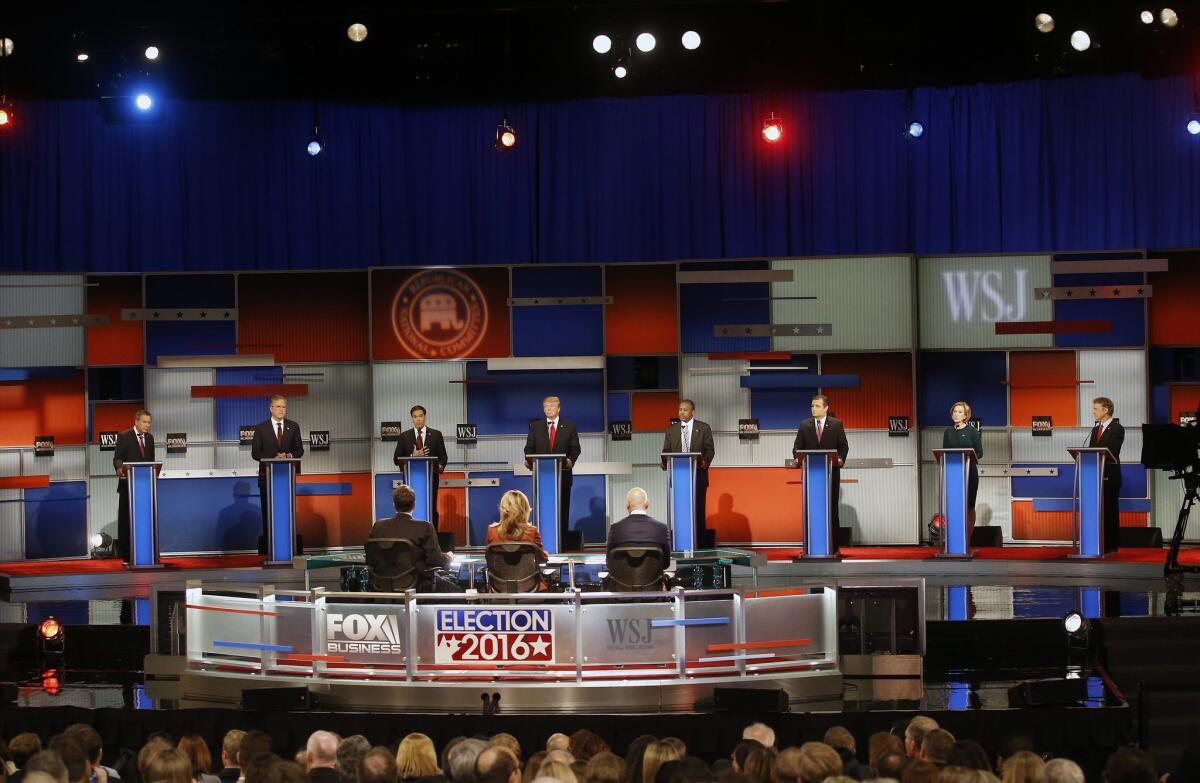
Republican presidential candidates John Kasich, Jeb Bush, Marco Rubio, Donald Trump, Ben Carson, Ted Cruz, Carly Fiorina and Rand Paul appear during Republican presidential debate at the Milwaukee Theatre.
The GOP field seems to have figured out how to fight Donald Trump: Belittle him.
Donald Trump has played 2016 titan for months, and most attacks from fellow candidates ended up hurting the attacker. But as Trump fights to maintain his lead, he has appeared more defensive.
The moderators survived.
Republicans complained that prior debates, especially the last one, were filled with too many "gotcha" questions and too much baiting of the candidates to fight one another.
Tuesday's debate was a sharp contrast, in which the hosts played a mostly deferential role. Moderator Neil Cavuto started by calling out “the elephant in the room,” promising issues would be front and center. “That is the agenda tonight: how each of you plans to make America better tomorrow.”
The debate moderators mostly stayed out of the way
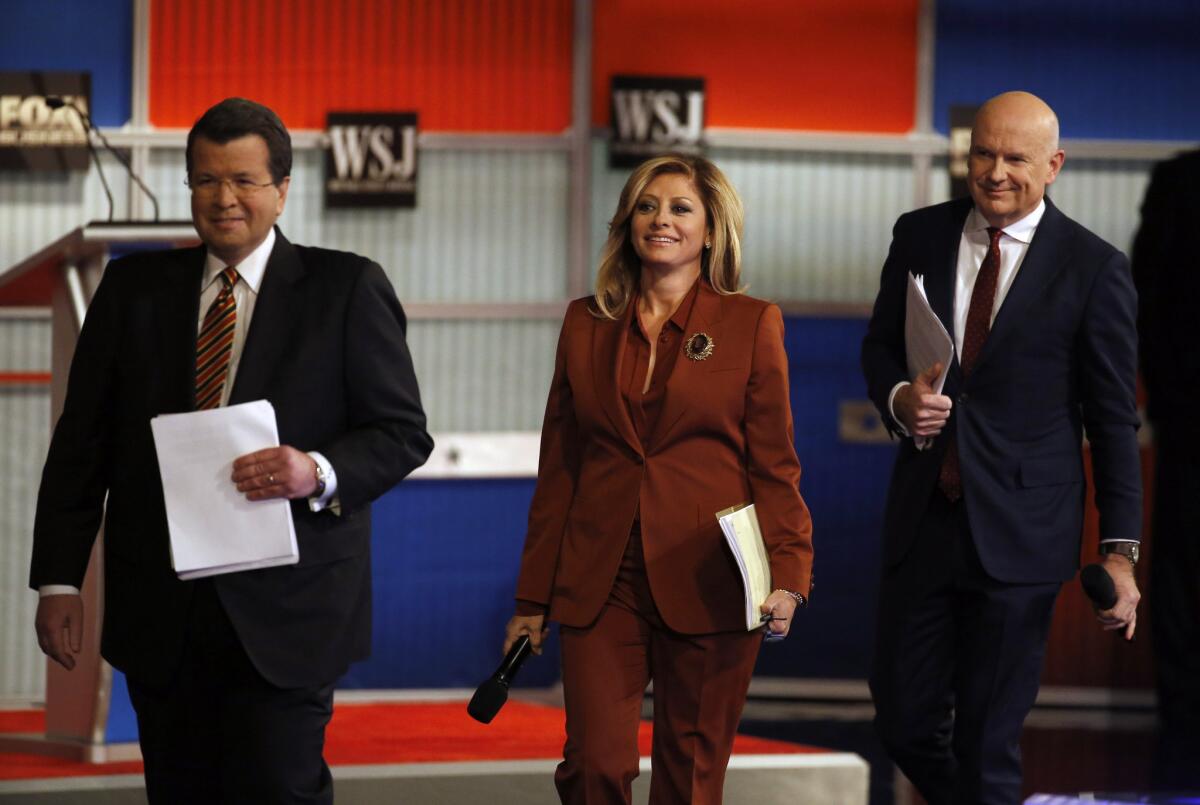
Moderators Neil Cavuto, left, Maria Bartiromo and Gerard Baker arrive on stage before the Republican presidential debate Tuesday in Milwaukee.
Perhaps the winners of the fourth Republican presidential primary debate were not any of the candidates on stage but the people asking the questions.
After blistering GOP reviews of the previous debate, those moderating Tuesday’s match-up in Milwaukee largely succeeded in producing a thoughtful exchange that exposed the differences among the candidates’ style and substance on a range of issues.
“Debates need to focus on the issues, and that goal was accomplished tonight,” said Republican National Committee Chairman Reince Priebus. “Our candidates, not the moderators, were at the center of tonight’s debate, and they were all treated with fairness and respect.”
Cruz spoke the most this time, by far
There was less wrangling for control of the floor during this debate, but speaking time still matters, and by that measure, Sen. Ted Cruz came out on top.
Cruz spoke for 13 minutes and 35 seconds -- nearly two minutes more than the runner-up, Ohio Gov. John Kasich, according to Politico. Ben Carson clocked in with the least amount of speaking time: 9 minutes and 22 seconds.
Here’s the full list.
Cruz: 13:35
Kasich: 11:51
Trump: 11:19
Fiorina: 11:00
Rubio: 10:20
Paul: 10:06
Bush: 9:50
Carson: 9:22
Donald Trump dominated the clock in the first two debates. He spoke for 10:30 during August's opening showdown, a full two minutes more than Jeb Bush, who came in second.
In the second debate, which was held in mid-September and lasted three hours, Trump got in 18:47 of speaking time, three minutes more than runner-up Bush.
The tide turned in the third debate, held last month: Carly Fiorina, with 10:32, and Sen. Marco Rubio, with 10:10, held the floor the longest.
Fear or inspiration? It's a big choice
In their closing statements, Carly Fiorina and Sen. Ted Cruz each went descriptive, painting pictures of the United States -- in very different ways.
Fiorina spoke of a nearly dystopian future she said would take place should Hillary Rodham Clinton win the election. “A Clinton presidency will corrode the character of this nation,” she warned.
Cruz infused his view of America with warmth and possibility. He spoke of the hope and promise his father saw when immigrating from Cuba in the 1950s and said he would steer the nation there again.
Optimism and pessimism? Fear or inspiration? It’s a big choice for campaigns, and not just theirs.
Fact check: Is Trump's campaign self-funded? Not completely.
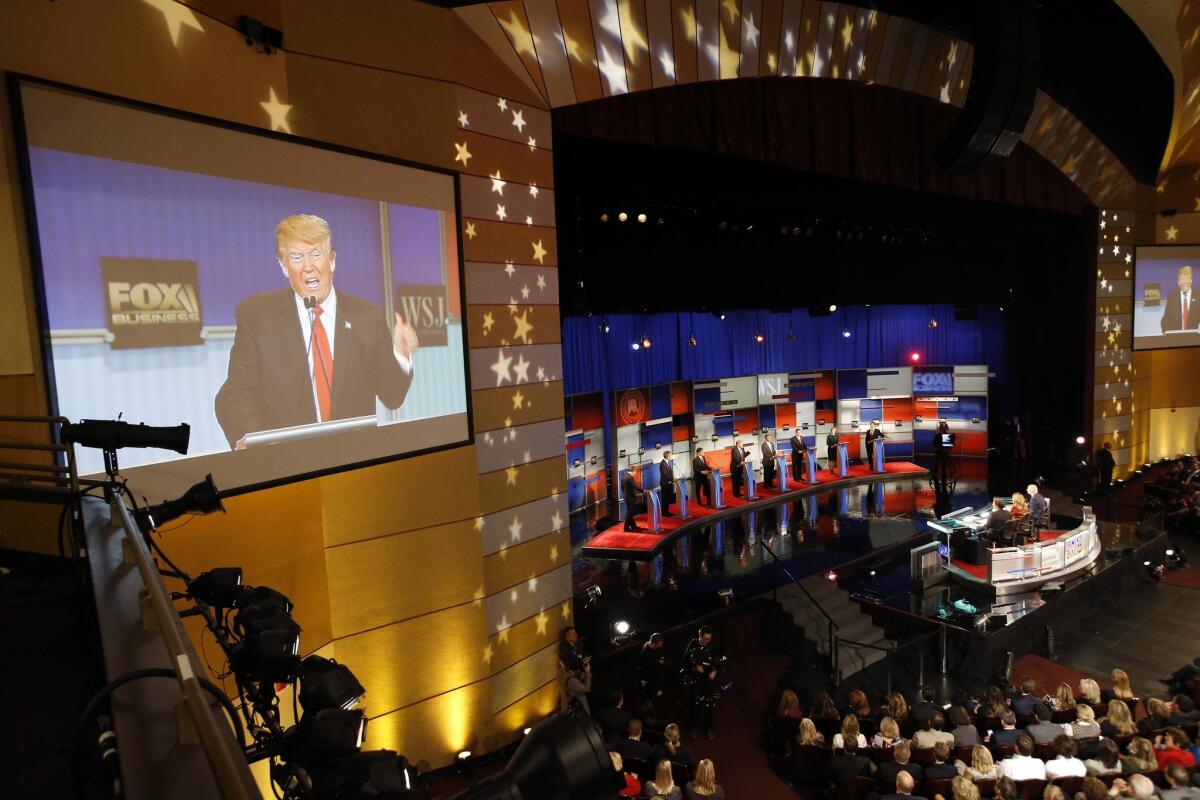
Donald Trump is seen on the screen as Republican presidential candidates John Kasich, Jeb Bush, Marco Rubio, Trump, Ben Carson, Ted Cruz, Carly Fiorina and Rand Paul appear during Republican presidential debate at the Milwaukee Theatre.
In his closing statement, Donald Trump repeated his frequent claim that his campaign for the presidency is self-funded. In fact, he has raised money from quite a few people: Nearly 74,000 people contributed to the Republican White House hopeful over the summer, and The Times' Mark Z. Barabak and Michael Finnegan wrote about why.
Rubio scores a hit in foreign policy scrum

Republican presidential candidates John Kasich, Jeb Bush, Marco Rubio, Donald Trump, Ben Carson, Ted Cruz, Carly Fiorina and Rand Paul appear during Republican presidential debate at the Milwaukee Theatre.
Republicans have long dominated national security politics, but Tuesday’s GOP debate exposed yet more differences between the party’s presidential hopefuls.
Donald Trump had an almost George W. Bush-like moment when he suggested that he knew Russian President Vladimir Putin well because the two had an encounter while taping an episode of “60 Minutes.”
The green-room summit couldn’t help but remind of former President Bush’s insistence that he, too, knew Putin after looking into his eye and getting "a sense of his soul."
Bush’s brother, former Florida Gov. Jeb Bush, tried to flex his credentials on the debate stage by pushing back against the non-interventionist tendencies of some in the party, including two of his opponents, Trump and Sen. Rand Paul (R-Ky.).
“We're not going to be the world’s policeman, but we sure as heck have to be the world’s leader,” Bush said.
But Sen. Marco Rubio’s team appeared to be doing victory laps after the segment came to a close. The Florida senator skillfully inserted himself into the exchange and delivered a rapid-fire attack on Putin as nothing but a “gangster” who needs to be countered with strong U.S. leadership.
“Grand slam,” read an email from Rubio’s campaign.
Wait, what is Dodd-Frank?
In the candidates' discussion of bank bailouts, the Dodd-Frank Act has been named several times.
But the act, passed in 2010, is not what bailed out the nation's teetering financial institutions.
As Times columnist Michael Hiltzik wrote last year, it was "designed to stem risky banking practices, improve consumer protections on financial products such as mortgages and credit cards, and provide regulators with more authority to deal with troubled big banks."
The moment that elicited boos from the audience
Here's one issue where Donald Trump and Hillary Clinton align
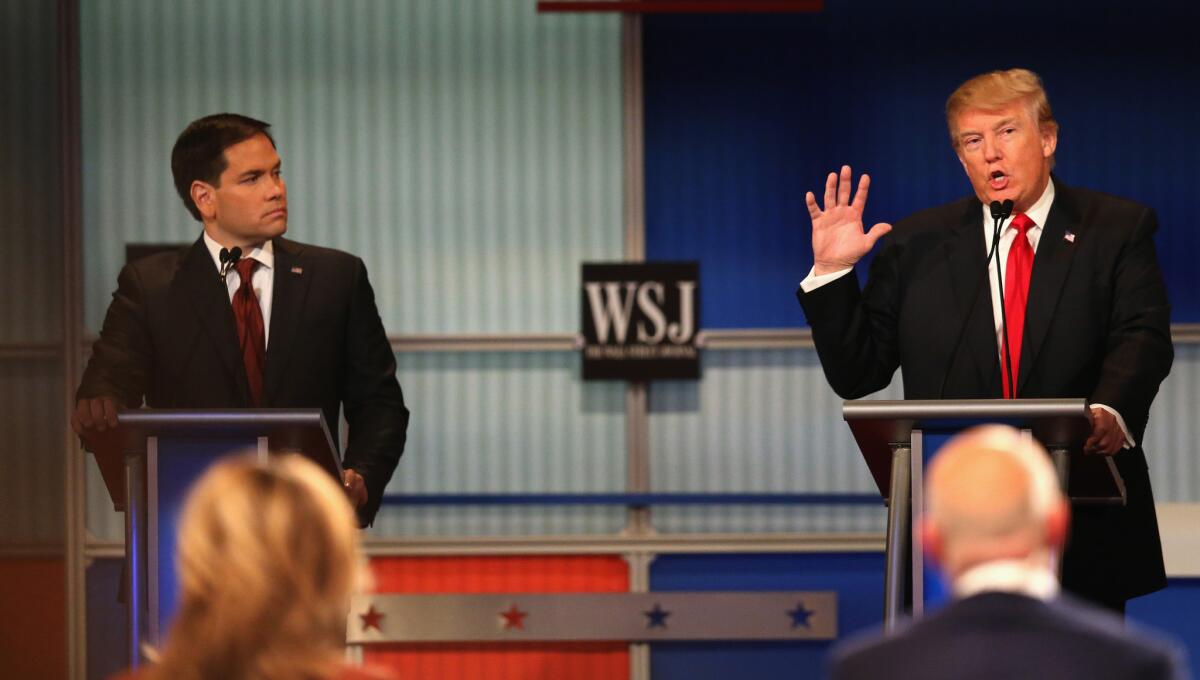
Presidential candidate Donald Trump (R) speaks while Sen. Marco Rubio (R-FL) looks on while Donald Trump looks on during the Republican Presidential Debate at the Milwaukee Theatre.
Donald Trump talks often about what a disaster it would be if Hillary Rodham Clinton were to be elected president, but when Tuesday night’s debate turned to the topic of international trade, Trump argued passionately for a position that could have been lifted from Clinton’s talking points.
He warned that the massive Pacific trade pact negotiated by the Obama administration is a bad deal for America because it doesn’t address currency manipulation.
Clinton often returns to currency manipulation as the reason she, too, is opposed to the deal, called the Trans-Pacific Partnership. Efforts to insert a provision clamping down on such manipulation fell short in Congress this year.
“TPP is a horrible deal,” Trump said. “It is a deal that is going to lead to nothing but trouble. It is a deal to allow the Chinese to come in through the back door like they always do.”
Trump had more to say, though using language that Clinton most definitely would not: “It is like Obamacare,” he said of the trade pact. “Nobody read it. They passed it; nobody read it. … We need smart people making the deals. And we don’t have smart people making the deals.”
The 12 nations that have pledged to adopt the deal – agreed on in part to help contain the rise of China – released the text of it last week.
Carson would return U.S. troops to Iraq
When asked his view about the U.S. troops in Syria and Afghanistan, Dr. Ben Carson said it's good the troops are there -- but if he were rolling out a strategy, he would turn his attention first to Iraq.
"In order to make [terrorists] look like losers, we have to destroy their caliphate," he said. "Our goal is not to contain them but to destroy them before they destroy us."
Taking land in Iraq has proved relatively straightforward for the U.S. in the past. The turmoil that followed as the U.S. tried to rebuild the country, however, proved much more difficult to contain.
Here's why Obamacare probably won't be repealed on Day One, or any day
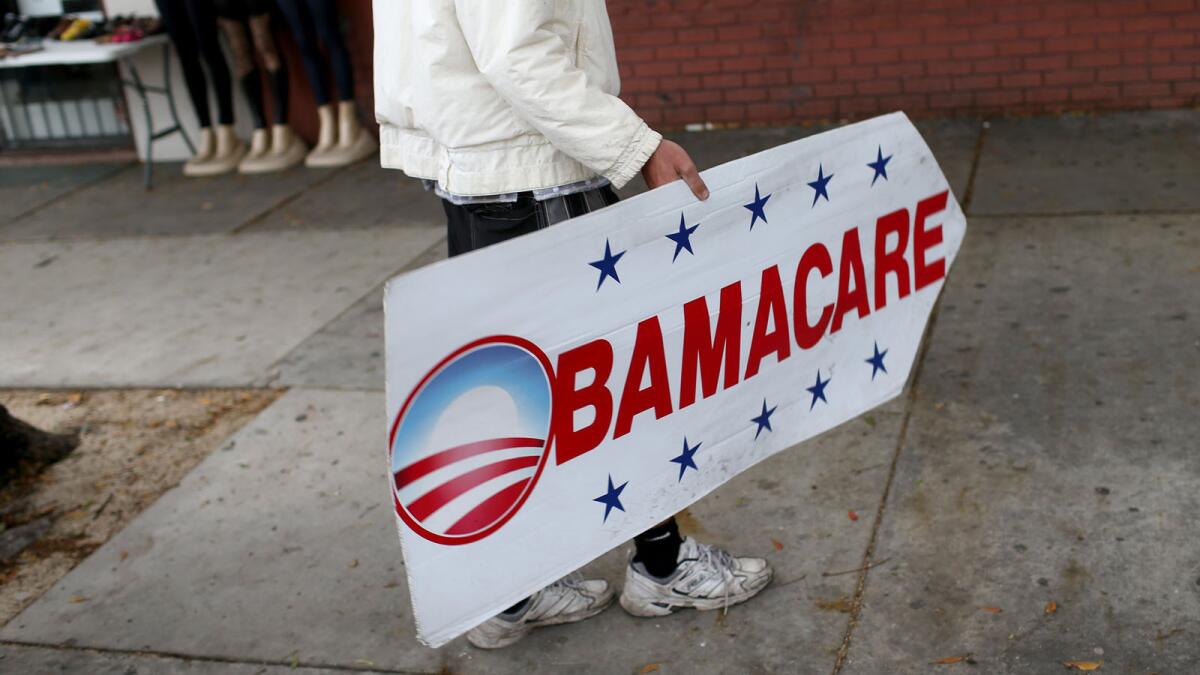
Millions of Americans could soon lose health insurance when the Supreme Court decides the latest challenge to the Affordable Care Act.
Tuesday’s debate brought renewed pledges from the presidential hopefuls that they would repeal the Affordable Care Act immediately upon taking office.
Donald Trump used the TPP discussion to make that pledge. TPP is so big that no one has read it, he said, which is what happened with Obamacare -- and look what a mess that is. "Yes, it will be replaced," Trump said.
While the promise has become something of an article of faith in the GOP, it is increasingly unrealistic, as even many Republican lawmakers and policy experts now concede.
Since the law’s major coverage expansion began in 2014, more than 9 million Americans have gained health insurance through Medicaid or through private insurance marketplaces created by the law.
The nation’s uninsured rate has fallen more rapidly than at any time in at least half a century.
And doctors, hospitals and insurers have invested hundreds of millions of dollars to implement the law, including building up new systems to meet quality standards in the law that are transforming the way many patients get care.
Rolling all this back would generate fierce opposition from millions of Americans and from many states where the law has been largely embraced, including California.
Repeal also would require a new president to come up with an alternative plan, a process that would likely involve difficult trade-offs, potentially messy negotiations with congressional and business leaders, huge disruptions to the existing healthcare system and billions of dollars in new funding.
Thus far, only a handful of GOP candidates have offered a blueprint for what their replacement would look like. And even those have not detailed how they would pay for a replacement.
Here's what makes Marco Rubio's tax plan different from the other Republicans' proposals
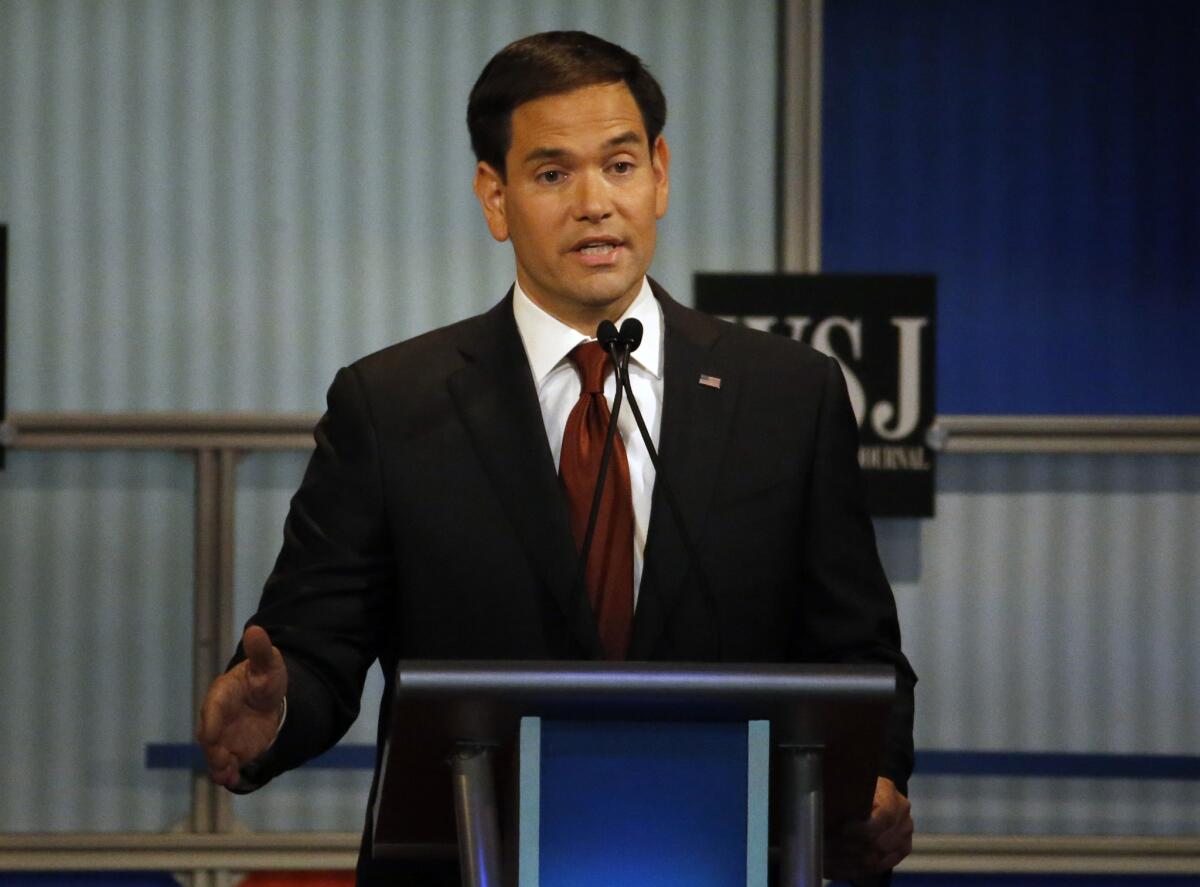
Marco Rubio speaks during Republican presidential debate at the Milwaukee Theatre.
Rand Paul challenged Marco Rubio on his tax plan Tuesday night, telling Rubio, “You cannot be a conservative if you’re gonna keep promoting new programs you’re not gonna pay for. … Can you be a conservative and be liberal on military spending? Can you be for unlimited military spending?”
Rubio defended his plan as a way to keep the U.S. safe, a direct appeal to the conservative crowd at the theater in Milwaukee.
The Times’ Lisa Mascaro explored how unorthodox Rubio’s tax plan, which includes a large credit for families with children, is among Republican proposals:
There’s little evidence Obamacare has killed jobs
Carly Fiorina attacked Obamacare on Tuesday night as a blow to the U.S. economy, particularly small businesses.
“Obamacare is crushing small businesses,” she said. “It is not helping the families it is intended to help.”
But as The Times’ Noam N. Levey reported when Fiorina went on the same line of attack during the last Republican debate, there’s little evidence that President Obama’s landmark healthcare law has destroyed jobs:
Carson's tax plan would hit homeowners and churches
Republicans underscore contrast with Democrats on minimum wage
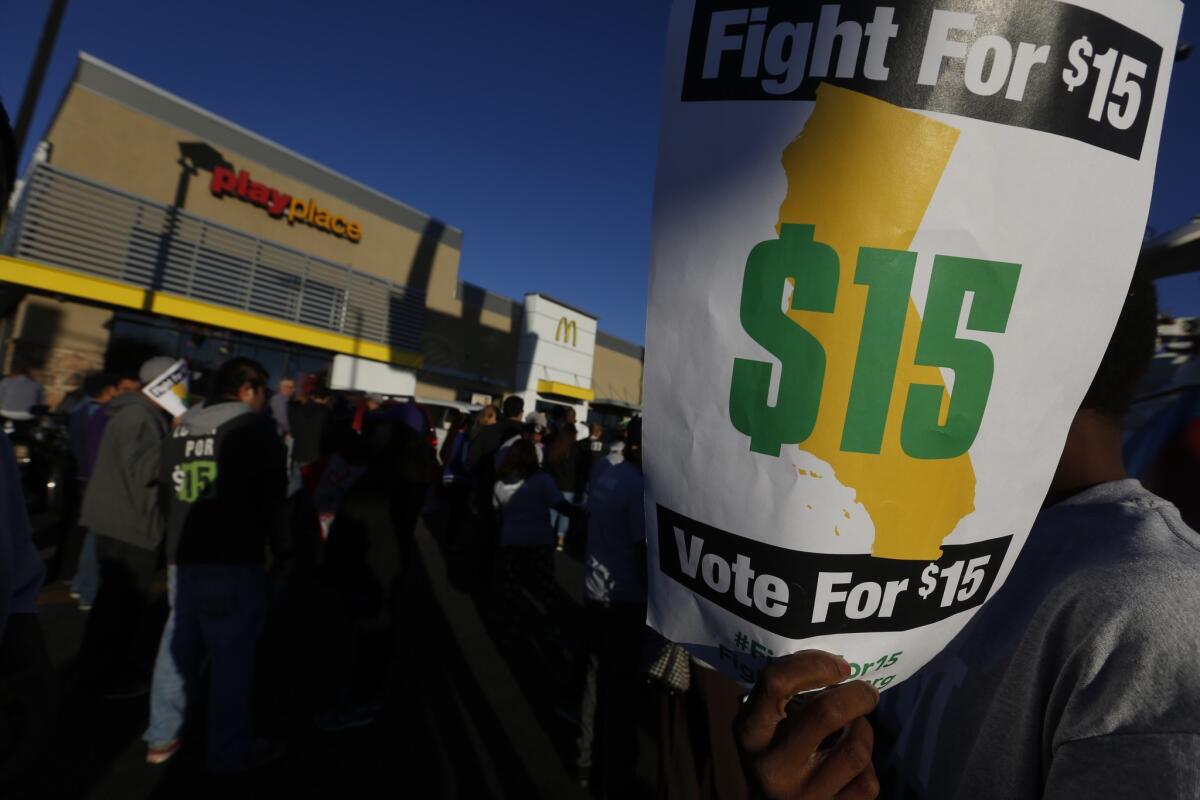
Protesters and activists carry signs and chant for higher wages in the parking lot at a McDonalds in South Los Angeles November 10, 2015. The Fight For 15 campaign is a nationwide effort to raise minimum wages and benefits at fast food restaurants. (Mark Boster/ Los Angeles Times)
On a national day of action for fast-food workers, who walked out of their jobs and demonstrated at large rallies in hundreds of American cities, some Republicans running for president were saying wages are already too great.
“Wages are too high,” said Donald Trump, when asked during Tuesday night’s debate whether he sympathizes with activists demanding the minimum wage be hiked to $15. “We are not going to be able to compete against the world. … We have to leave it the way it is. We just can’t do it.”
It was not a surprising position. Republicans have been out front about their opposition to increasing the minimum wage. But Democrats were surely delighted to see Republicans talk about it on a prominent national stage. All the Democrats running for president want to see a hike to at least $12 an hour, and they return to the issue repeatedly on the campaign trail.
Hillary Rodham Clinton's campaign made sure her supporters were aware of the discussion. It sent them an email minutes after the Republicans moved on from the minimum-wage issue, quoting what each of the candidates on the stage said.
The Republican candidates warned a wage hike would be disastrous. “If you raise the minimum wage, you are going to make people more expensive than a machine,” Florida Sen. Marco Rubio said. Ben Carson warned that a wage hike would create a surge of joblessness among African Americans.
Only Ohio Gov. John Kasich offered an alternative point of view. He stopped short of saying he supports a wage hike, but he also warned: “Economic theory is fine, but you know what? People need help. … To just look the other way is not acceptable.”
Let's touch base again
Deportation 'won't work,' Bush and Kasich say
Ben Carson becomes a front-runner and his record is closely examined
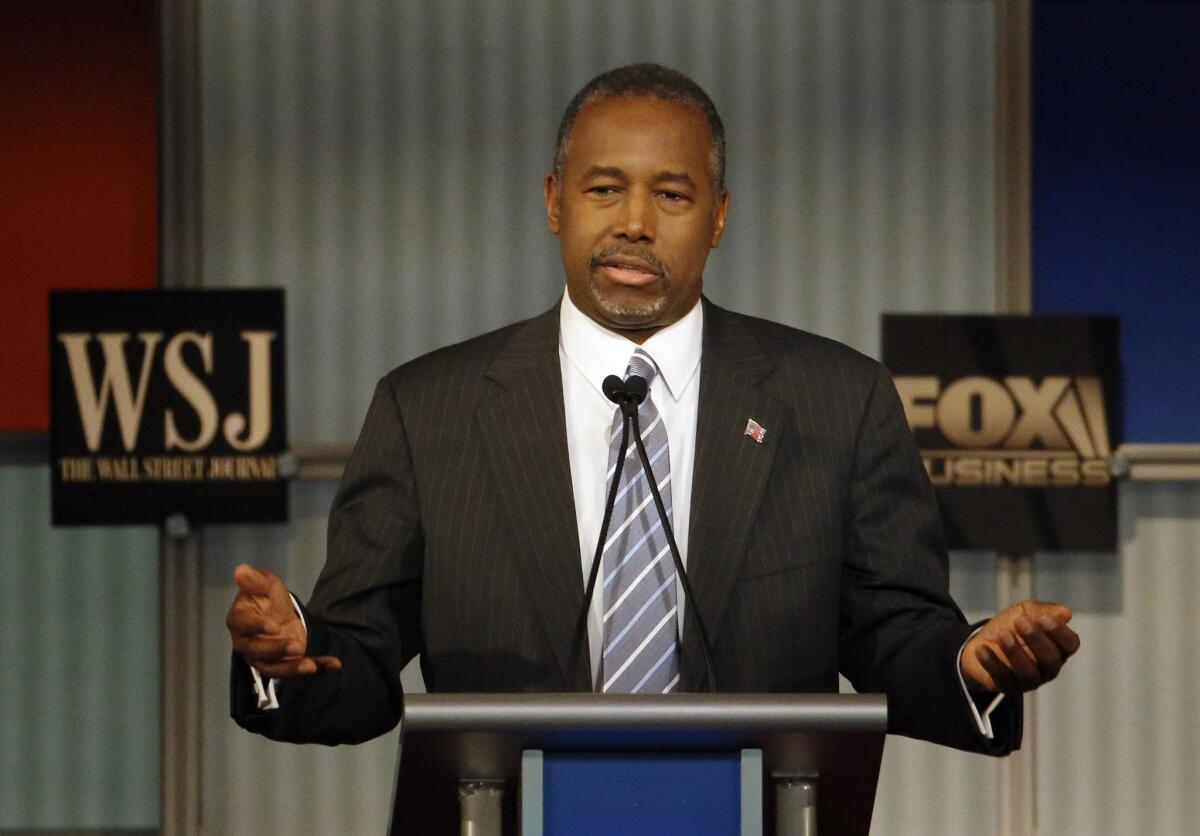
Ben Carson speaks during Republican presidential debate at Milwaukee Theatre, Tuesday, Nov. 10, 2015, in Milwaukee. (AP Photo/Morry Gash)
Dr. Ben Carson, who has edged Donald Trump in several recent polls, faced new scrutiny in recent days as his profile has risen, and he defended himself Tuesday night and demanded that journalists closely examine all candidates, particularly Democrats.
“We have to start treating people the same, and people who know me know that I’m honest,” Carson said to applause during the debate.
Carson was accused by Politico of “fabricating” that he was offered a full scholarship to the United States Military Academy at West Point. Carson responded that he never applied, a point he has made multiple times in the past, but that he was encouraged by local military leaders to apply for an appointment to the school. Students at the academy do not pay for tuition or room and board, but most commit to several years of military service upon graduation.
The Politico headline and story were clarified, though the news organization said it stood by its original reporting. A Politifact appraisal of Carson’s comments rated them “mostly true,” though in need of clarification.
And CNN spoke to several people who knew Carson growing up and could not find any who confirmed Carson’s tales of struggling with a violent temper and trying to stab a friend, before his faith helped him suppress such urges. The Wall Street Journal could find no evidence to support stories Carson has told about protecting white high school classmates from rioting black students, or being the sole student to pass an honesty test by a Yale professor.
Carson and his campaign stood by his accounts and accused the media of a “political hit job.”
So, how's it going so far?
Fiorina invokes 'challenging the status quo'
A tonal shift for Cruz
That's a big shift from his tone at the debate two weeks ago.
As for the substance of his answer:
What Marco Rubio left out in introducing himself to viewers
Marco Rubio mentioned early in tonight’s debate that he’s the “son of a bartender and a maid.” What Rubio did not mention, though, is that he spent some of his formative years in Nevada, marching in a union picket line alongside his barkeep father and persuading his family to trade Catholicism for the Mormon Church. The Times’ Lisa Mascaro got the story from Rubio’s old neighborhood off the Las Vegas Strip:
Kasich defends his minimum-wage stance
By the way:
Carson and Rubio wouldn't raise it either
Fact check:
Donald Trump wouldn't raise minimum wage
Times editorial board member Jon Healey detects some spin:
Some local texture
Tonight's debate is being held in Milwaukee.
Here comes the RNC chairman
Santorum wins the Twitter chatter contest for the undercard
Rick Santorum provides a meme-able moment
Rick Santorum gave the Internet a nice Howard Dean-esque moment to meme about.
"You know why I respect the Democrats?” he said. “Because they fight!"
If the Internet gives us a Santorum-Mortal Kombat mash-up, we will let you know.
5 takeaways from the undercard debate
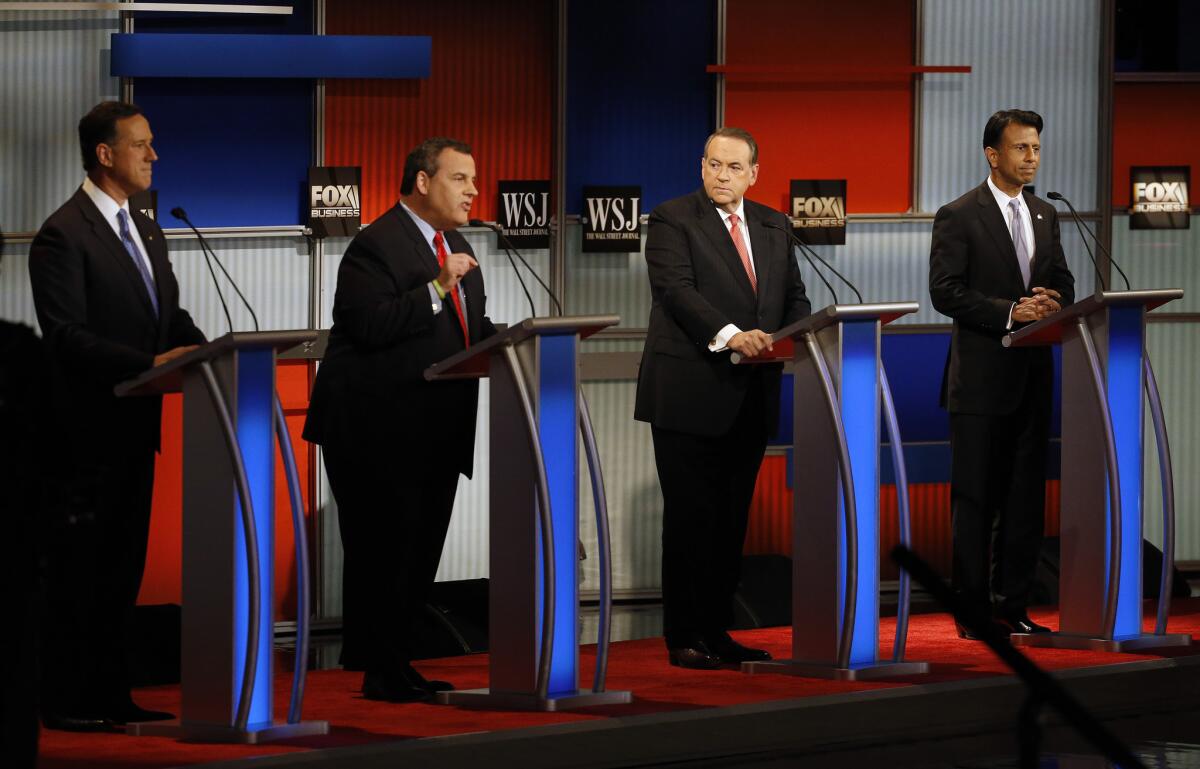
Chris Christie, second from left, speaks as Rick Santorum, left, Mike Huckabee and Bobby Jindal wait during the Republican presidential debate at the Milwaukee Theatre.
1. Bobby Jindal attacks
Louisiana Gov. Bobby Jindal has had little luck gaining traction in the 2016 campaign. But he did produce one memorable line Tuesday night, when he mocked Chris Christie’s description of himself as a tax-fighting, fiscally conservative governor in New Jersey.
“I will give you a ribbon for participation and a juice box,” Jindal said of Christie’s record in New Jersey, as he sought to make the case that he’s accomplished more than the others on stage. Jindal attacked his rivals relentlessly. He accused Christie and former Arkansas Gov. Mike Huckabee of allowing spending to continue to rise in their states unchecked. “Just sending any Republican [to Washington] is not enough,” Jindal said. “Under your leadership in New Jersey, your budget has gone up 15%. You’ve had nine credit downgrades.”
2. Christie won’t be baited
Christie made clear that he’s confident he won’t compete in the undercard for long. He took the posture of a front-runner. He refused to indulge Jindal in a tit-for-tat. Instead, he complimented his rival, telling the crowd that Jindal has been a great governor. Christie focused all his attacks in one direction: Hillary Rodham Clinton’s.
“Hillary Clinton is coming for your wallet, everybody,” Christie said. “Don’t worry about Huckabee or Jindal. Worry about her.”
At one point, Christie declared that the candidates were wasting precious time debating the finer points of their records as governor. “If I go to New Jersey, they will call me lots of different things,” Christie said to Jindal. “But 'liberal' is not one of them.”
Closing statements sum up the undercard debate
If you missed the debate, the closing statements were a good summary:
A struggling Louisiana Gov. Bobby Jindal attempted to paint a contrast between himself and the rest of the GOP field, insisting he is the Republican best suited to "take on the establishment." Former Sen. Rick Santorum stuck to his focus on working families and spoke of the importance of "making things" in America again.
Former Arkansas Gov. Mike Huckabee shared a story about a third-grader who sent $6 in the mail to support his campaign. He said he would be a president who didn't forget where he came from.
Meanwhile, Gov. Chris Christie kept his eye on the prize: Hillary Rodham Clinton. He slammed her admission that Republicans are among the enemies she is proudest of making.
Calling her comment disgraceful, Christie cast himself as the candidate who can "bring this entire country together."
Candidates happy to discuss veterans
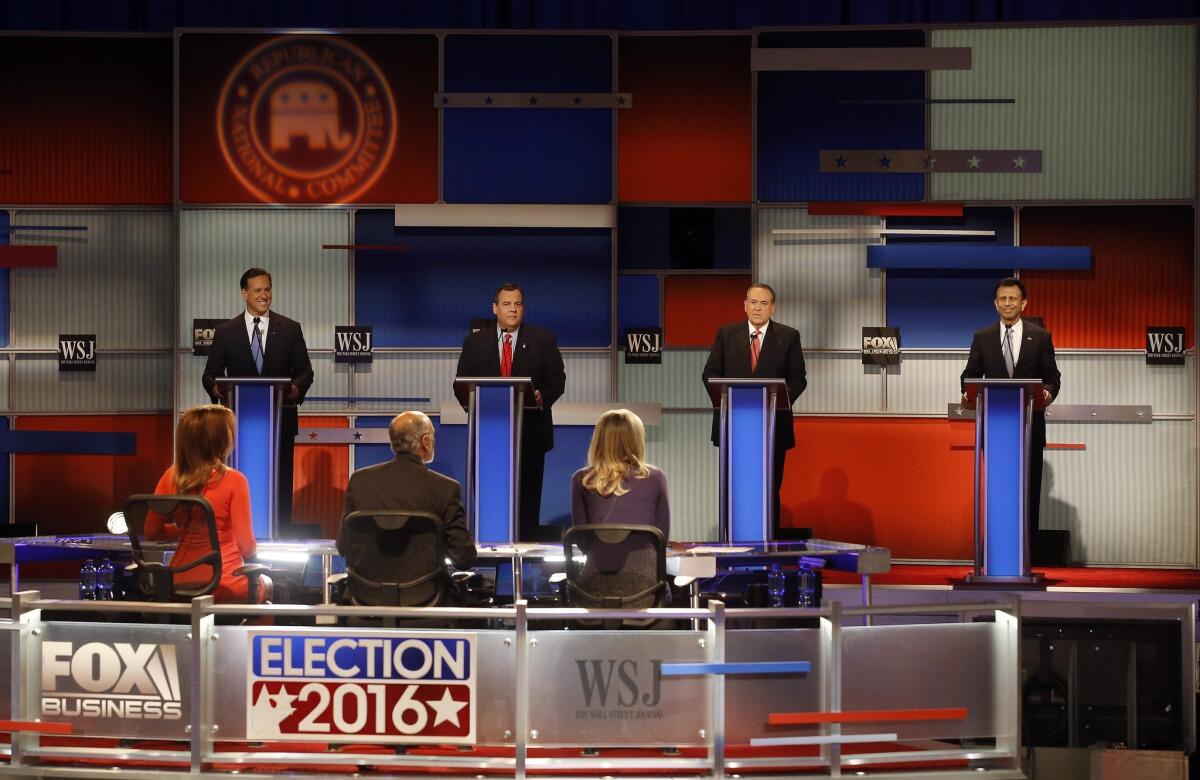
Republican presidential candidates Rick Santorum, Chris Christie, Mike Huckabee and Bobby Jindal during the debate at the Milwaukee Theatre.
The question: How do we restore that sense of duty and pride that was the hallmark of the “greatest generation” who fought in World War II?
Jindal said, “We need to fire some of these VA bureaucrats,” and some should go to jail for the troubles in that department.
Huckabee said that veterans would “sure appreciate a better paycheck” and if the nation kept its promises to take care of their medical care and put them in a position to send their children to college.
Christie said he would give veterans respect – unlike Hillary Rodham Clinton, who he said doesn’t understand the VA crisis and doesn’t respect veterans’ service.
Santorum said he has the experience to use troops properly. President Obama’s strategy, he said, puts troops “in harm’s way for political purposes.”
Clinton campaign preemptively picks winners of GOP debate
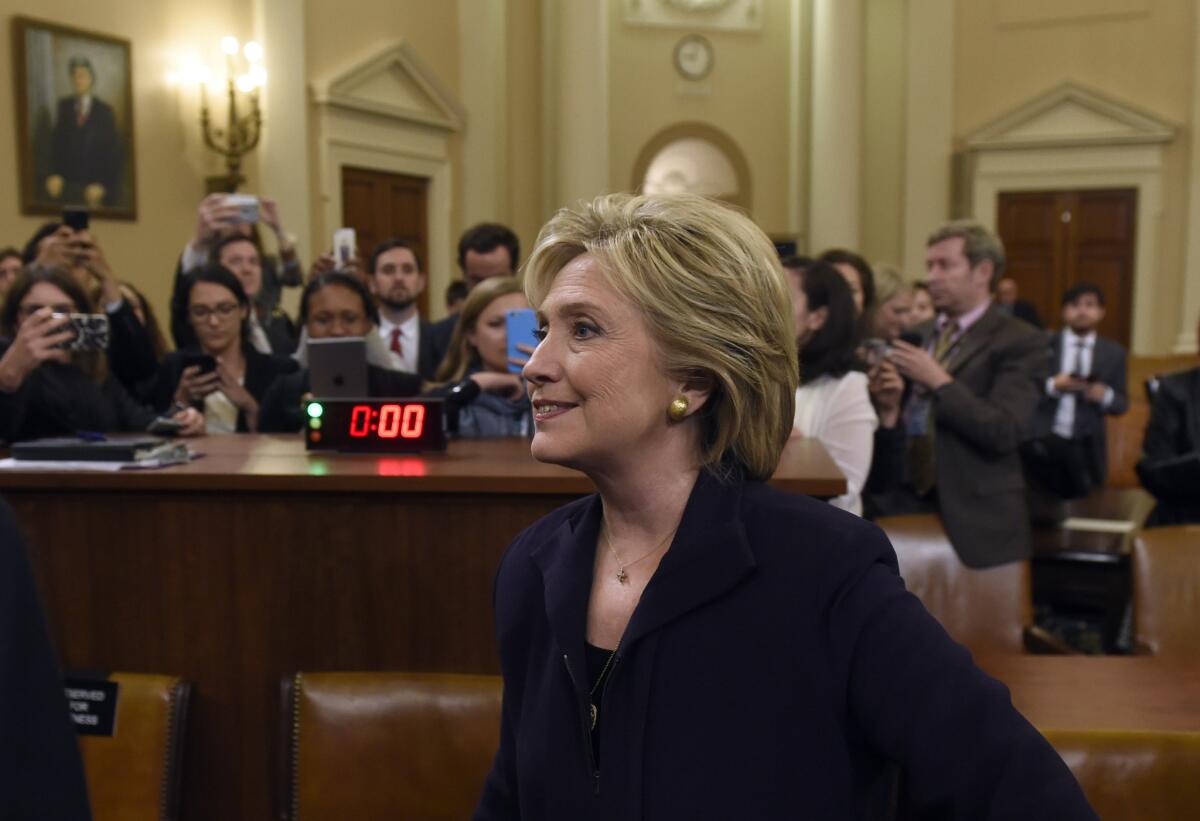
Former Secretary of State Hillary Rodham Clinton leaves after she testified before the House Select Committee on Benghazi on Capitol Hill on Oct. 22.
Hillary Rodham Clinton’s campaign poked a bit of fun at the Republican field ahead of Tuesday’s debate, preemptively picking winners.
Among the campaign’s selections:
Former Florida Gov. Jeb Bush was anointed the most likely to fall asleep. “It was close, Dr. [Ben] Carson, but Gov. Bush had you beat!” the campaign wrote in the fundraising email.
Both men have been criticized by Donald Trump as “low-energy,” a preferred insult of Trump’s.
Trump, the businessman-turned-reality-show-star, was labeled the candidate most likely to forget what he is yelling about, as he is yelling about it. “But it will somehow end with making America great again,” the campaign wrote.
Texas Sen. Ted Cruz was also singled out for his view on gay rights, and the entire GOP field for supporting the defunding of Planned Parenthood.
GOP wants seniors' votes, Fed answers show
Chris Christie tries to rise above GOP debate undercard status
Demoted to the undercard stage at the Republican debate, New Jersey Gov. Chris Christie had an opportunity to rise above circumstance.
And, after persistent attacks by Louisiana Gov. Bobby Jindal on fellow Republicans, he showed he might deserve better.
Christie steered the debate away from Jindal’s continued pounding against former Arkansas Gov. Mike Huckabee and other candidates he deemed insufficiently conservative and back to the party’s main target -- Democrat Hillary Rodham Clinton:
“We better stay focused as Republicans on her,” Christie nudged. “We need someone who knows how to beat Democrats.”
But in the next round of questioning, Jindal did not let up.
“Let’s not just beat Hillary,”Jindal said. “Let’s elect a conservative to the White House.”
Both governors have lagged in polls, which prevented them from taking the main debate stage, but they represent the opposing wings in the GOP war over whether the party should nominate an establishment-backed candidate who can appeal to a broader swath of voters or a strict conservative who will rouse the base.
Question ignored across the board
Louisiana Gov. Bobby Jindal was the first to refuse to answer.
Following Jindal’s lead, Mike Huckabee decided to talk about something else instead: the Department of Veterans Affairs.
New Jersey Gov. Chris Christie followed suit, using his time to say Democratic lawmakers aren’t standing behind police officers.
Rick Santorum addressed an earlier question and then cranked up the volume, giving a somewhat positive nod to the other party. "You know why I respect the Democrats?” he said. “Because they fight!"
Jindal goes after Christie, who just keeps focusing on Clinton
Focus is on the moderators, and they're asking fewer questions so far
Right out of the gate, the IRS takes heat
The four undercard candidates take the stage
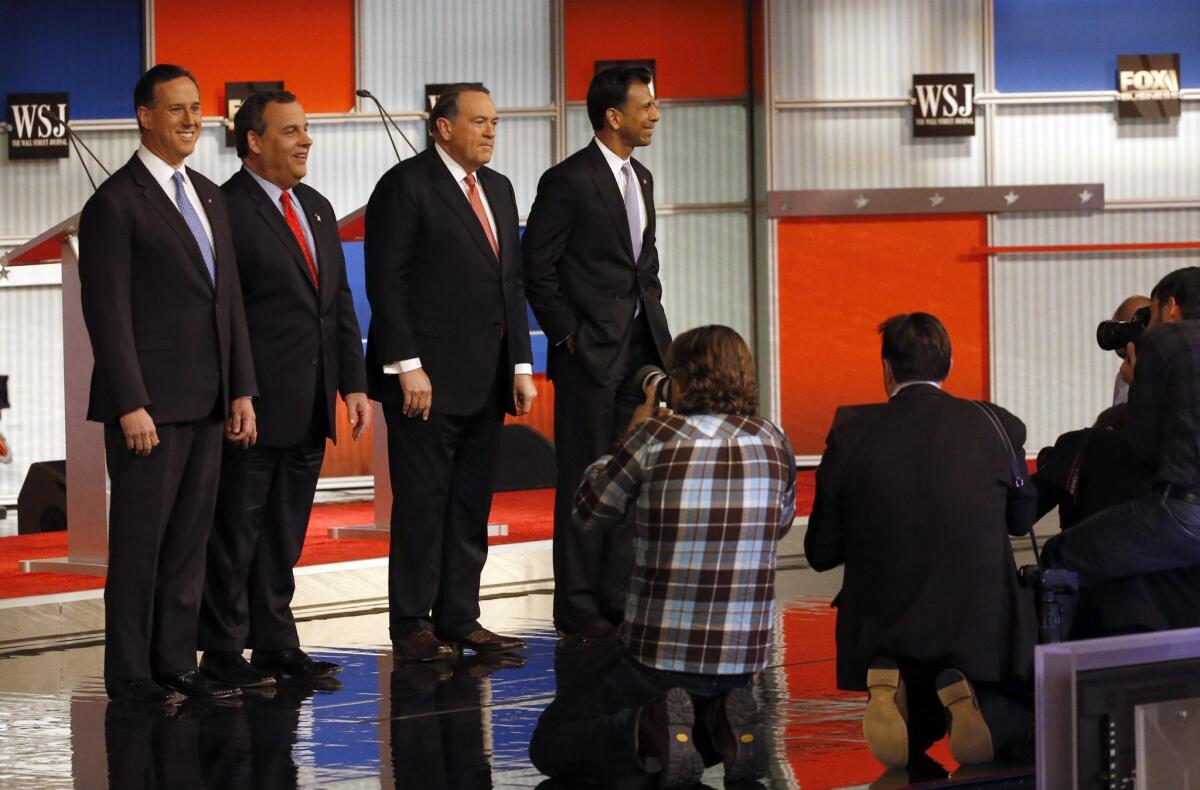
Republican presidential candidates Rick Santorum, Chris Christie, Mike Huckabee and Bobby Jindal take the stage.
How to watch tonight’s Republican presidential debates
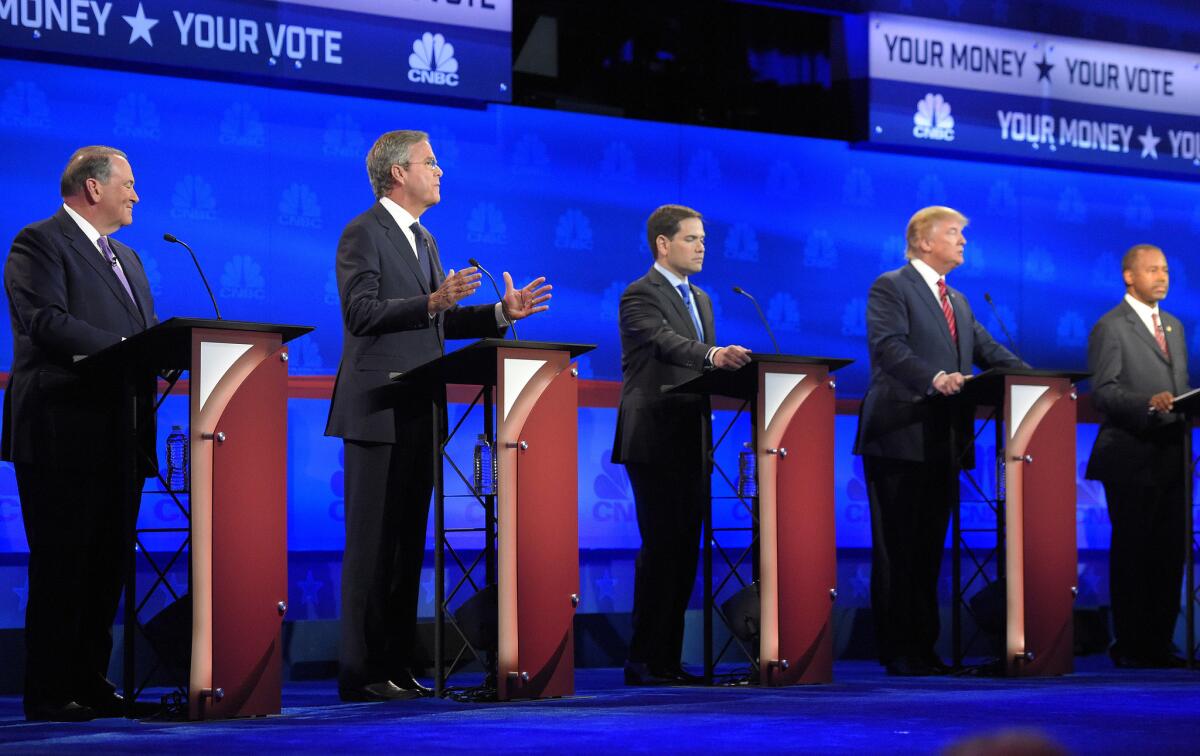
Jeb Bush, second from left, is flanked by Mike Huckabee, left, Marco Rubio, center, Donald Trump, second from right, and Ben Carson during the CNBC Republican presidential debate at the University of Colorado, Wednesday, Oct. 28, 2015, in Boulder, Colo.
Details of tonight’s debates come courtesy of the host, Fox Business Network:
7 p.m. Eastern: New Jersey Gov. Chris Christie, Louisiana Gov. Bobby Jindal, former Arkansas Gov. Mike Huckabee and former Sen. Rick Santorum will take questions for an hour.
Asking the questions: The opening-round questions will come from Fox Business Network anchors Sandra Smith and Trish Regan and the Wall Street Journal’s Washington Bureau Chief Gerald Seib.
9 p.m. Eastern: Donald Trump, Dr. Ben Carson, Sen. Marco Rubio, Sen. Ted Cruz, Carly Fiorina, former Florida Gov. Jeb Bush, Ohio Gov. John Kasich and Sen. Rand Paul take the stage for two hours.
Asking the questions: This debate will be moderated by Neil Cavuto, FBN's managing editor of business news, and Maria Bartiromo, the network’s global markets editor. Joining them will be WSJ’s editor-in-chief, Gerard Baker.
Subject matter: Both debates are expected to focus on economic issues.
How to tune in: The debates will be broadcast live from the Milwaukee Theater, airing on the Fox Business Network and streaming live on FOXBusiness.com.
Finding the Fox Business Network channel in your area at the network site .
FBN says it has teamed up with providers including DirecTV, Suddenlink, Mediacom, Frontier, Wide Open West and Cable One to make the debates available to all their subscribers.
The network also says the iOS Fox Business App will have live stream and the Fox News App will have live stream on both iOS and android.
Man tells Hillary Clinton he wants to 'strangle' the other female candidate for president
During a public exchange Tuesday, a man told Hillary Rodham Clinton that he wants to “strangle” Republican presidential candidate Carly Fiorina. Clinton laughed and told him, “I wouldn’t mess with you.”
During an event at a Veterans of Foreign Wars hall in New Hampshire, the Democratic front-runner took a question from the man, who said he had friends who lost their jobs and homes during hard times at Hewlett Packard when Fiorina was CEO.
“Every time I see her on TV, I want to reach through and strangle her," the man said, according to a CBS report. "I know that doesn't sound very nice."
As the audience laughed in response, Clinton joined in.
"I wouldn't mess with you," she said.
The back-and-forth is bound to come back and haunt Clinton, who in the past has called out Donald Trump for failing to condemn “hateful rhetoric.”
Asked later by a journalist if she took the man seriously, Clinton shook her head "no," CBS' Rebecca Kaplan reported.
At Clinton events, the WiFi password is a pro-Hillary message
Ted Cruz aide shares the not-so-secret password for wireless access at the debate site
As the questions fly, the questioners will be in the spotlight too
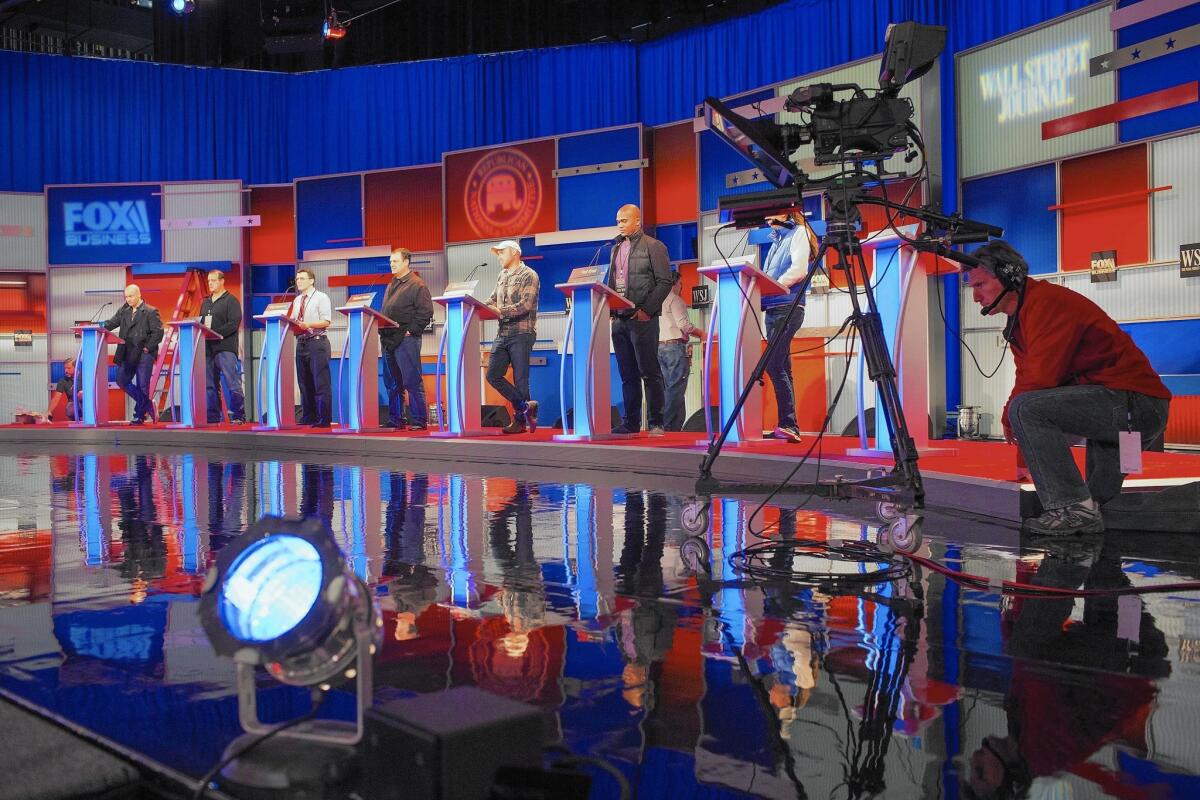
Workers test the setup at the Milwaukee Theatre before Tuesday’s Republican presidential debate.
The spotlight won’t just be on the eight candidates in tonight’s Republican presidential debate.
The attention is shifting to the debate moderators, as the candidates draw them into the fray as well.
The network sponsors of the faceoffs have mostly ignored candidates' demands for more control over the debate format, fueling an "us versus them" dynamic between those on stage and those in front of it.
Read more about how that may serve some of the candidates as they try to win over supporters before the early nominating contests . . .
Scott Walker's pre-debate analysis: Americans have 'had it with Washington'
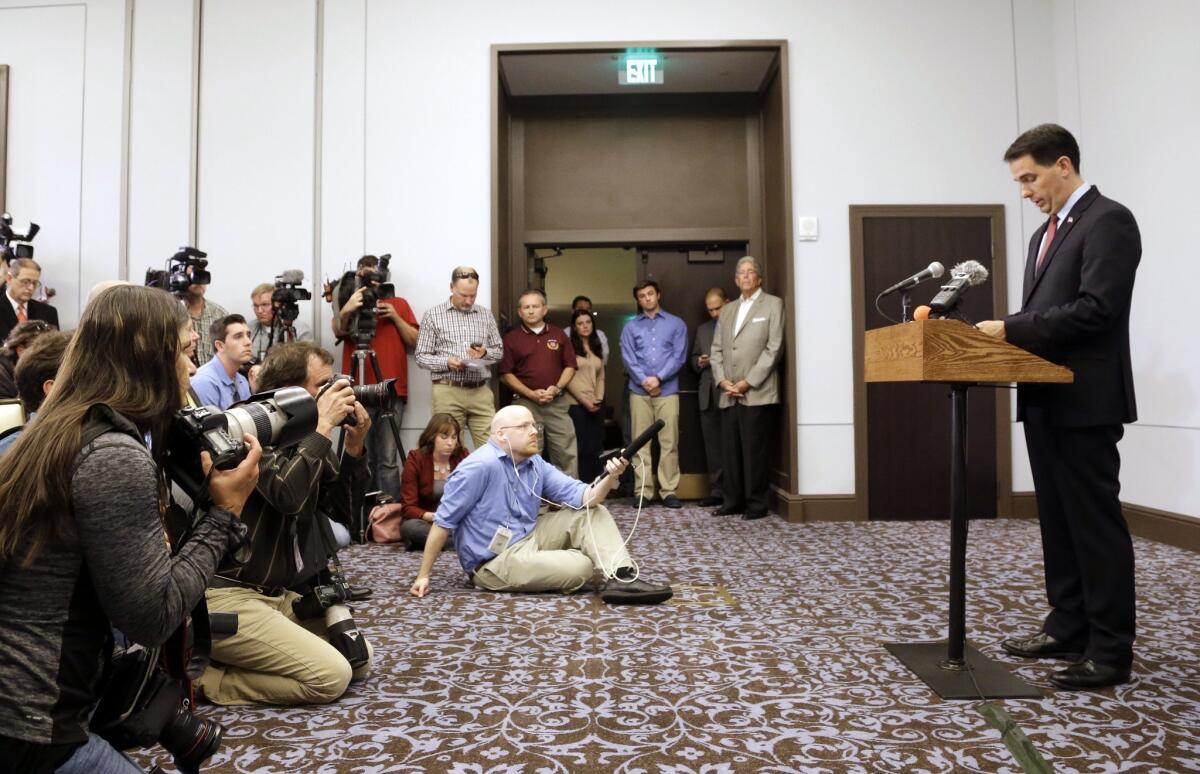
Wisconsin Gov. Scott Walker speaks at a news conference on Monday, Sept. 21, in Madison, Wis., where he announced that he is suspending his Republican presidential campaign.
MILWAUKEE--Wisconsin Gov. Scott Walker, just six months ago a formidable presidential contender, believes next year's presidential campaign will center on a pinnacle issue: anger with Washington.
"People have largely had it with Washington, they're frustrated with Washington, they feel like Washington is disconnected from themselves," the Republican said Tuesday at a pre-debate breakfast hosted here by the Wall Street Journal.
"People are tired of what they perceive as the same old thing out of Washington,” he said, “and they want leaders who are fundamentally going to change it."
Walker ended his presidential campaign in September amid weak poll numbers. He'd hoped to fill a craving for an outside-the-Beltway candidate, but he was quickly overrun by Donald Trump and Ben Carson. Neither of them has held elected office at all.
As he left the race, Walker urged rivals to consider dropping out and helping the party unite behind one strong candidate.
He echoed the sentiment on Tuesday as the party prepared for the evening debate.
"Any of the candidates that you have on stage tonight," he said, "are infinitely better than Hillary Clinton."
What the candidates at the Republican debate must do to make their mark
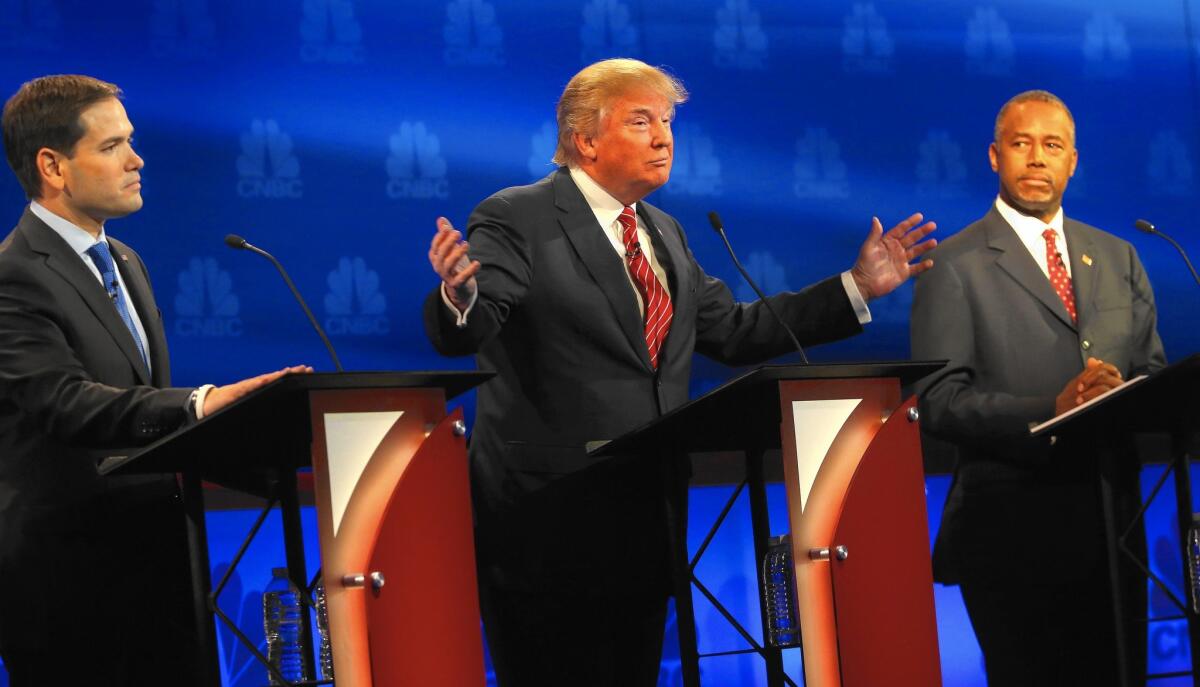
Can Jeb Bush “fix it,” as his new slogan promises?
Can Ben Carson dismiss questions about his biography as a "political hit job” against him by the media?
Can Marco Rubio credibly and confidently clarify the details of his past under the hot stage lights?
Tune in here for more on what to watch in Tuesday night’s debate . . .
Why Seth Meyers has 'nothing but sympathy' for debate moderators
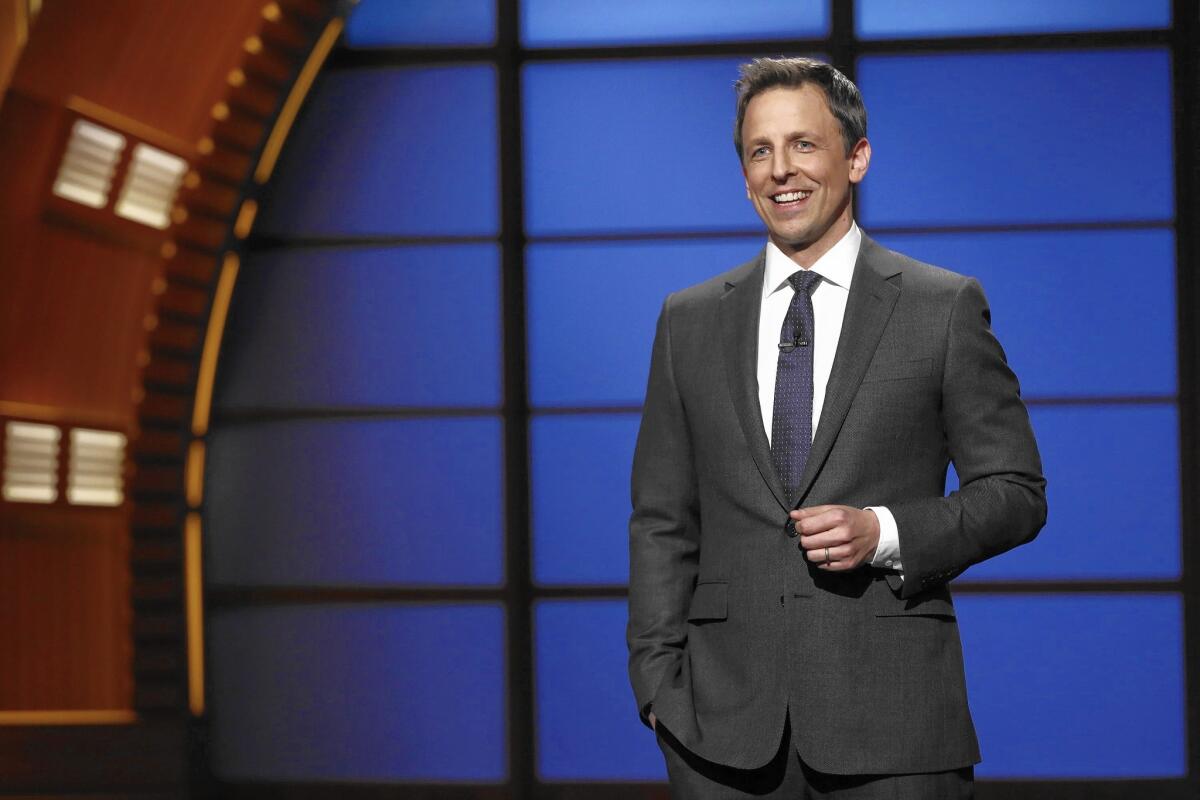
Seth Meyers
The hot lights are on the candidates, but late-night TV host Seth Meyers says political debates are tough for the questioner, too.
“Democrats, Republicans, when you interview them, if you don't cut them off, they'll talk the whole time,” Meyers tells the Los Angeles Times. “They love uninterrupted airtime.”
Some moderators handle the challenge better than others, Meyers says, but they're dealing with players who show up prepared to blow past the rules.
“When they say the rules are 60 seconds for an answer,” he says, “you can tell all the candidates take that as a suggestion more than an instruction.”
Read more for the full Q&A
Trump takes on Rubio before GOP debate
Last night, Twitter users got a peek into GOP candidate Donald Trump’s potential strategy for Tuesday’s GOP debate in Milwaukee. Trump posted a volley of tweets attacking rival Sen. Marco Rubio and the candidate’s history on immigration policy.
Trump called Rubio’s approach to immigration “very weak” at a campaign event in Illinois earlier Monday. He referred to Rubio’s role as one of the so-called Gang of Eight senators in 2013 who pushed for legislation that eased the process to citizenship for people in the U.S. illegally. The proposal was passed by the Senate but went nowhere in the House.
His tweets later Monday continued the criticism.
Thanks in part to his own well-received performance in the last debate, Rubio rose in recent polls , and has drawn more attacks from rival candidates.
Whether or not Trump will take his time to continue his break down of Rubio’s presidential chances remains unknown.
"I have no idea what's going to happen, but it will be interesting," Trump said about the debate in a Tuesday interview with Good Morning America .
'SNL' ratings jump with Trump
Despite a slew of negative reviews, GOP candidate Donald Trump attracted one of the largest audiences for his latest stint on "Saturday Night Live."
An estimated 9-10 million people tuned in — more than for 2015 hosts Miley Cyrus, Amy Schumer and Tracy Morgan, according to Nielsen.The ratings — 6.6 and a 16% share of the TV audience — were the highest since NBA star Charles Barkley hosted in January 2012. This number still came in lower than when Sarah Palin appeared on "SNL" in October 2008.
Reviewers by and large didn’t believe that Trump's performance merited the numbers.
The Los Angeles Times’ Mary McNamara warned that ratings are too nuanced and varied in today’s TV market.
“But ratings have never been the same as votes — just ask the cast of "Empire" — or even political support, and for all his frequently self-referenced business experience, Trump seems to have missed a major shift in the television industry: Ratings ain't what they used to be,” McNamara said in her Times column.
Variety ’s Maureen Ryan called the sketches with Trump “weak, timid or predictable.”
“It’s pretty standard for a host to read most of his lines off cue cards, as Trump did stiffly in all his scenes, but when the rest of the cast appears ill at ease and many of the jokes fail to land, the sketches can seem interminable,” Ryan said in her Variety column.
A.V. Club ’s Dennis Perkins said the show came off as a no-win situation for both "SNL" and Trump.
“Trump supporters can fob off their disappointment in the quality of the show on cast and writers, but only the most blinkered could deny that the candidate came off as stilted, bland, and unprepared in the very little screen time he was given,” Perkins said in his A.V. Club column.
"SNL" aside, Trump still remains at or near the top in polls going into Tuesday’s GOP debate in Milwaukee.
For NBC, though, giving Trump 12 minutes and five seconds of screen time means the network owes a total of nearly three hours to the other presidentia candidates, according to the Federal Communications Commission “equal time” rule. The other candidates can request their airtime during the next week. It's not yet clear if any candidates will ask for that time.
How Bernie Sanders is wooing Latino voters
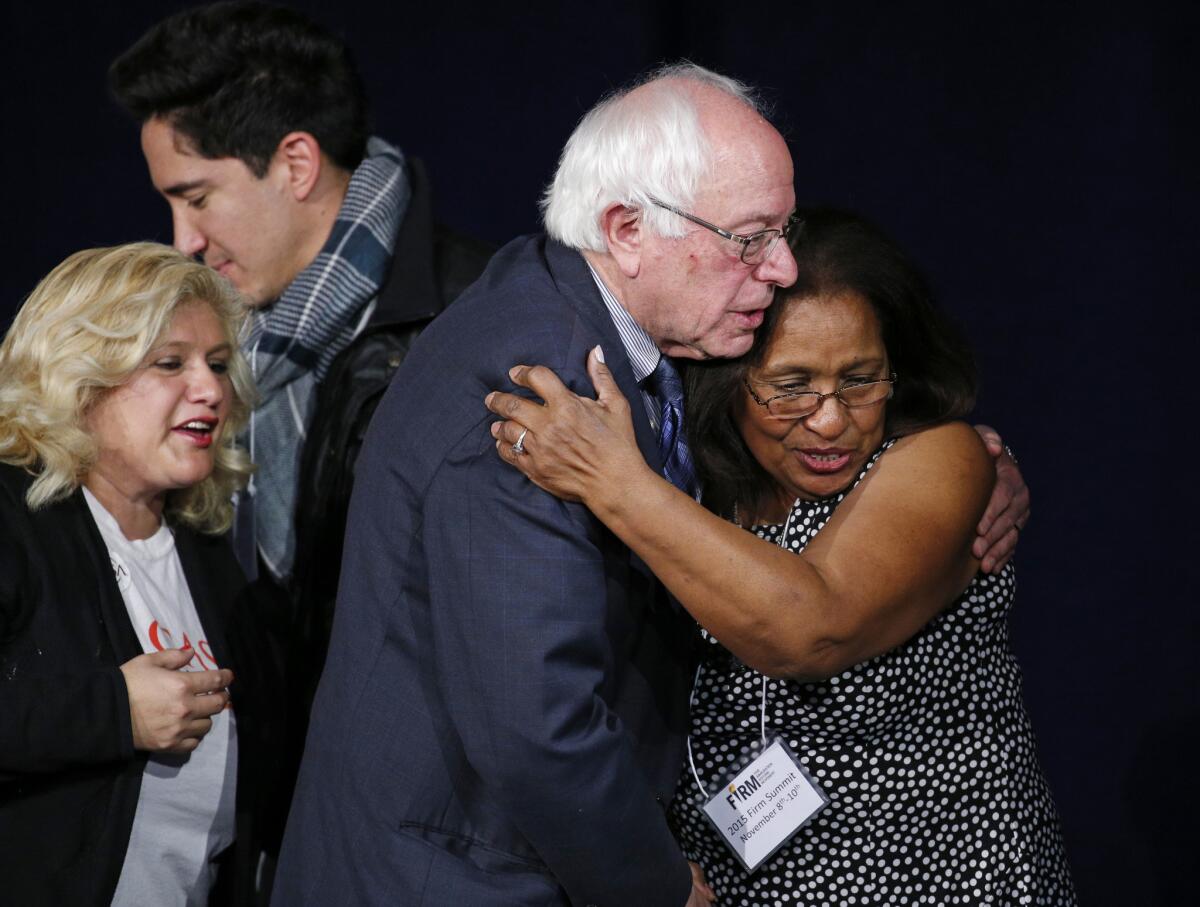
Democratic presidential candidate Sen. Bernie Sanders, I-Vt., second from right, embraces Pricilia Rodriguez-Trillo at the Fair Immigration Reform Movement presidential candidate forum, Monday, Nov. 9, 2015, in Las Vegas. Sanders took questions on issues, including immigration reform and jobs, from participants on stage. (AP Photo/John Locher)
Bernie Sanders is making a major new push to connect with Latino voters, a group he’ll need desperately to best Democratic front-runner Hillary Rodham Clinton in Nevada’s Feb. 20 caucus and in other Latino-heavy states.
His campaign has hired several prominent activists in recent weeks, along with Arturo Carmona, a well-known organizer who previously headed the Latino advocacy group Presente.org. On Sunday, Sanders held a rally in a Latino neighborhood featuring a 10 –piece mariachi band. On Monday, at a forum on immigration, he vowed to close privately run immigrant detention centers and to protect from deportation all immigrants without legal status who have been in the U.S. for at least five years.
He has a tough climb ahead. Clinton, affectionately known to many Latinos here as “La Hillary,” has had staff working Nevada’s precincts since April. Her campaign has 22 paid staff members in Nevada who have been knocking on doors and calling voters daily, asking them to sign cards pledging to back her at the caucus meetings. Sanders opened his first campaign office in Nevada only last month.
“It’s going to be hard for him to win given that he’s setting up his campaign infrastructure this late in the game,” said Andres Ramirez, a political consultant in Las Vegas who specializes in Latino outreach. “It’s going to be hard to overcome the traction she’s already got.”
Another obstacle? Many Latinos still don’t know who Sanders is.
By the numbers
Get the L.A. Times Politics newsletter
Deeply reported insights into legislation, politics and policy from Sacramento, Washington and beyond. In your inbox three times per week.
You may occasionally receive promotional content from the Los Angeles Times.
